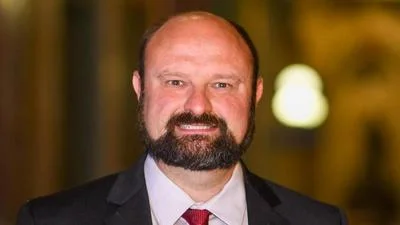Illinois state Rep. Kevin Schmidt (R-Cahokia Heights) | repschmidt.com
Illinois state Rep. Kevin Schmidt (R-Cahokia Heights) | repschmidt.com
After spending two weeks in Illinois under the protection of Gov. J.B. Pritzker, Texas House Democrats have returned to their state, ending a dramatic walkout aimed at blocking a Republican-led redistricting plan.
But their temporary refuge in one of the most gerrymandered states in the country has sparked a firestorm of criticism, especially from Illinois Republicans like State Rep. Kevin Schmidt (R-Millstadt), who calls the episode a glaring example of Democratic hypocrisy.
“The Democrats’ faux outrage is completely performative,” Schmidt told the Metro East Sun. “Gerrymandering has been a part of the political process for a long time. The map the Democrats drew in Illinois is one of the most gerrymandered monstrosities ever assembled. It is true for the Congressional map and it is definitely true for the state map.”
Democrats in the Illinois General Assembly currently hold a 14-3 advantage in the state’s congressional delegation. Meanwhile, in the General Assembly Republicans hold only 33% of the seats in the House and 32% in the Senate.
Illinois’ approach to redistricting has drawn some of the strongest rebukes from nonpartisan watchdogs. Independent analysts, including Princeton’s Gerrymandering Project, have given Illinois’ congressional map an “F” grade for fairness.
Common Cause has also cited Illinois as a model of what not to do, and critics say Pritzker’s public image as a defender of democracy is at odds with his record at home.
Pritzker, who previously supported the idea of an independent redistricting commission, has repeatedly dodged questions about Illinois’ partisan map.
On Meet the Press, he accused Texas Republicans of trying to “steal seats,” but refused to address criticisms from watchdog groups about his own state's redistricting practices, calling the argument a “distraction.”
Prior to that, in an appearance on The Late Show with Stephen Colbert, Pritzker joked that Illinois' congressional district maps were drawn by a "Kindergarten class"—comments Schmidt says reflect a disturbing level of detachment from public frustration.
“Pritzker may have meant it when he made that promise but he showed his real loyalty is not to voters but to the leaders of his party,” he said. “Voters want reform. Unfortunately, the Democratic party has and will continue to do everything in their power to stop redistricting reforms.”
During the walkout by Texas Democrats they temporarily blocked a Republican-drafted congressional map that could flip five seats to GOP control, potentially adding five more Republican-held seats to the U.S. House, which is narrowly controlled by Republicans, 217–216.
Pritzker welcomed the absconding Texas Dems with open arms, calling their actions a “defense of democracy.
”Illinois Republicans say the irony is impossible to ignore.
“Voters feel disenfranchised,” Schmidt said. “They are tired of Chicago Democrats forcing their radical ideology onto the rest of the people of this state. They want a voice in the process but thanks to Illinois’ one-party rule – they don’t.”
Republicans argue that one-party dominance in Illinois has produced unfair maps and an exclusionary legislative process that strips them of debate rights and redirects grant funding to Democratic districts while excluding Republican ones.
Schmidt criticized the state budget process, accusing Democrats of sidelining Republican districts during funding allocations.
“The budget process is a joke,” he said. “The Democrats do not include Republicans in the process. Republican districts receive few if any project funding. Everyone pays taxes in this state. The money should be allocated fairly, and political party affiliation should not impact the budget process. We need real reform, and we need it now.”
Schmidt, who has supported the FAIR Map Amendment in previous legislative sessions, said an independent redistricting commission is essential to restoring voter trust and increasing electoral competitiveness.
“An independent map process would open the door to more competitive districts,” he said. “Voters would benefit by having a real debate on the issues. Most districts are so partisan that most of the time there is not even a race. An independent map would be a big improvement to the current partisan map drawing process.”
Illinois’ gerrymandering legacy dates back decades, with former House Speaker Michael Madigan, who in October will begin a 7.5 year prison sentence for public corruption, playing a central role in designing maps to entrench Democratic power.
In 2016, the state Supreme Court, then controlled by Madigan-aligned justices, blocked a Fair Maps initiative from appearing on the ballot.
“The effort to get the FAIR Map Amendment on the ballot needs to continue,” Schmidt said. “We need to give voters the opportunity to weigh in on this important issue.” California Democrats, another heavily gerrymandered Democrat-controlled state, is now pushing a new proposal that would add five more Democratic seats to Congress, mirroring the Republican strategy in Texas.
Meanwhile, State House Minority Leader Tony McCombie has filed a brief with the Illinois Supreme Court to advance a lawsuit challenging the Illinois’ partisan gerrymandered maps. McCombie emphasized that the lawsuit is about restoring voters’ constitutional rights and ensuring fair representation for all Illinois residents, arguing that the current map silences many voices
For Schmidt, the takeaway is simple, Illinois voters are being failed by a system that benefits politicians, not the people.
“There is no consistency on the remap issue from either party,” Schmidt said. “The map drawing process has historically been a function of political parties. Both parties draw districts to give themselves advantages. If anyone is truly concerned about the partisan aspect of district maps – then they should get involved in pushing for real efforts to take the partisan politics out of the process.”
Schmidt represents the 114th House District, which includes St. Clair County and the cities of Belleville, Centreville, East St. Louis, Fairview Heights, Lebanon, Mascoutah and O'Fallon.






 Alerts Sign-up
Alerts Sign-up